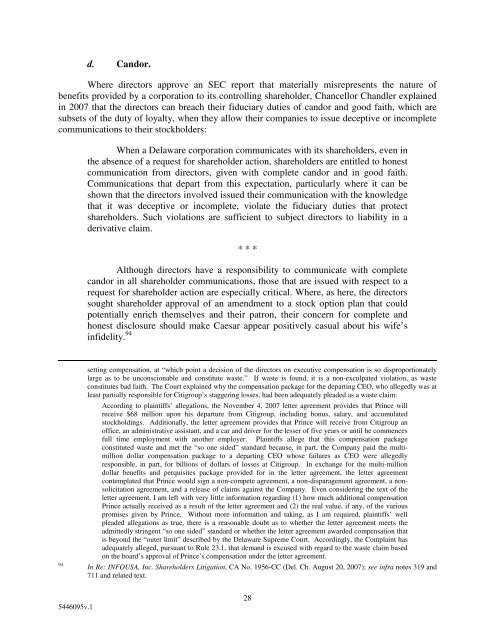fiduciary duty issues in m&a transactions - Jackson Walker LLP
fiduciary duty issues in m&a transactions - Jackson Walker LLP
fiduciary duty issues in m&a transactions - Jackson Walker LLP
You also want an ePaper? Increase the reach of your titles
YUMPU automatically turns print PDFs into web optimized ePapers that Google loves.
d. Candor.Where directors approve an SEC report that materially misrepresents the nature ofbenefits provided by a corporation to its controll<strong>in</strong>g shareholder, Chancellor Chandler expla<strong>in</strong>ed<strong>in</strong> 2007 that the directors can breach their <strong>fiduciary</strong> duties of candor and good faith, which aresubsets of the <strong>duty</strong> of loyalty, when they allow their companies to issue deceptive or <strong>in</strong>completecommunications to their stockholders:When a Delaware corporation communicates with its shareholders, even <strong>in</strong>the absence of a request for shareholder action, shareholders are entitled to honestcommunication from directors, given with complete candor and <strong>in</strong> good faith.Communications that depart from this expectation, particularly where it can beshown that the directors <strong>in</strong>volved issued their communication with the knowledgethat it was deceptive or <strong>in</strong>complete, violate the <strong>fiduciary</strong> duties that protectshareholders. Such violations are sufficient to subject directors to liability <strong>in</strong> aderivative claim.* * *Although directors have a responsibility to communicate with completecandor <strong>in</strong> all shareholder communications, those that are issued with respect to arequest for shareholder action are especially critical. Where, as here, the directorssought shareholder approval of an amendment to a stock option plan that couldpotentially enrich themselves and their patron, their concern for complete andhonest disclosure should make Caesar appear positively casual about his wife’s<strong>in</strong>fidelity. 9494sett<strong>in</strong>g compensation, at “which po<strong>in</strong>t a decision of the directors on executive compensation is so disproportionatelylarge as to be unconscionable and constitute waste.” If waste is found, it is a non-exculpated violation, as wasteconstitutes bad faith. The Court expla<strong>in</strong>ed why the compensation package for the depart<strong>in</strong>g CEO, who allegedly was atleast partially responsible for Citigroup’s stagger<strong>in</strong>g losses, had been adequately pleaded as a waste claim:Accord<strong>in</strong>g to pla<strong>in</strong>tiffs’ allegations, the November 4, 2007 letter agreement provides that Pr<strong>in</strong>ce willreceive $68 million upon his departure from Citigroup, <strong>in</strong>clud<strong>in</strong>g bonus, salary, and accumulatedstockhold<strong>in</strong>gs. Additionally, the letter agreement provides that Pr<strong>in</strong>ce will receive from Citigroup anoffice, an adm<strong>in</strong>istrative assistant, and a car and driver for the lesser of five years or until he commencesfull time employment with another employer. Pla<strong>in</strong>tiffs allege that this compensation packageconstituted waste and met the “so one sided” standard because, <strong>in</strong> part, the Company paid the multimilliondollar compensation package to a depart<strong>in</strong>g CEO whose failures as CEO were allegedlyresponsible, <strong>in</strong> part, for billions of dollars of losses at Citigroup. In exchange for the multi-milliondollar benefits and perquisites package provided for <strong>in</strong> the letter agreement, the letter agreementcontemplated that Pr<strong>in</strong>ce would sign a non-compete agreement, a non-disparagement agreement, a nonsolicitationagreement, and a release of claims aga<strong>in</strong>st the Company. Even consider<strong>in</strong>g the text of theletter agreement, I am left with very little <strong>in</strong>formation regard<strong>in</strong>g (1) how much additional compensationPr<strong>in</strong>ce actually received as a result of the letter agreement and (2) the real value, if any, of the variouspromises given by Pr<strong>in</strong>ce. Without more <strong>in</strong>formation and tak<strong>in</strong>g, as I am required, pla<strong>in</strong>tiffs’ wellpleaded allegations as true, there is a reasonable doubt as to whether the letter agreement meets theadmittedly str<strong>in</strong>gent “so one sided” standard or whether the letter agreement awarded compensation thatis beyond the “outer limit” described by the Delaware Supreme Court. Accord<strong>in</strong>gly, the Compla<strong>in</strong>t hasadequately alleged, pursuant to Rule 23.1, that demand is excused with regard to the waste claim basedon the board’s approval of Pr<strong>in</strong>ce’s compensation under the letter agreement.In Re: INFOUSA, Inc. Shareholders Litigation, CA No. 1956-CC (Del. Ch. August 20, 2007); see <strong>in</strong>fra notes 319 and711 and related text.5446095v.128
















